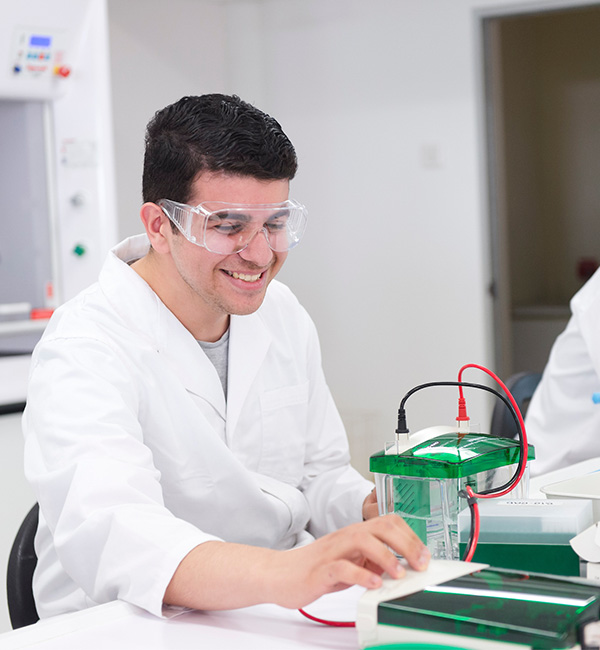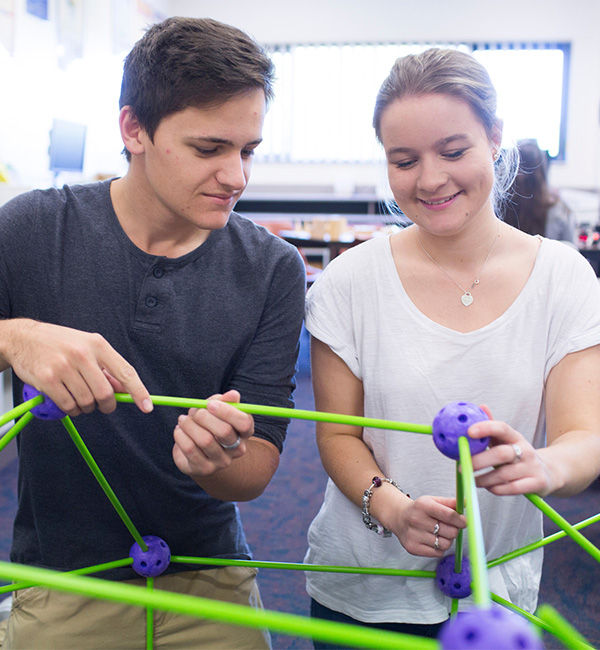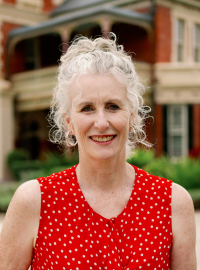Course information for - 2026 entry
International
- Domestic
- International
- Domestic
- International
Offered at 2 locations
- Melbourne
- Strathfield
- Melbourne
- Strathfield
- Duration
- 4 years full-time or equivalent part-time
- CRICOS Code
- 0102075
- Fees (first year)*
- $35624
- Start dates
- February 2026, February 2027, February 2028
This course is also available online.
Domestic students enrolled in this course may be eligible for the Commonwealth Prac Payment. Read more about the payment and browse the eligibility criteria.
Overview
If you want the flexibility of multiple career options to teach in primary or secondary schools, the Bachelor of Education (Primary and Secondary) is the perfect degree for you. As both a primary and secondary teacher you will be able to inspire, nurture and engage young people in a positive learning journey. This degree will equip you with deep knowledge of critical ideas and pedagogical approaches to meet the diverse learning needs of students.
With this dual-sector qualification, you will develop a breadth of skills in primary curriculum and one specialist secondary teaching area. You will gain a solid foundation in primary English and literacies, mathematics, humanities and social science, digital technologies, health and physical education and the arts. You will then shape your professional identity with a secondary specialisation.
With a Bachelor of Education degree from ACU, you will graduate classroom ready with real-world practical experience through 80 days of professional experience in schools and education settings under direct supervision and guidance.
Achieve your goals with a scholarship.
A generous Commonwealth Teaching Scholarship is available to support new undergraduate and postgraduate students enrolling in an initial teacher education (ITE) program to help meet the costs of their study. Learn more about eligibility and how to apply here.
Get paid to learn with a Victorian Government ITE scholarship. Victorian students enrolling in a secondary school initial teacher education (ITE) program can apply to help cover the cost of studying. Learn more about eligibility and how to apply here.

Professional experience
You will be required to complete 80 days of embedded professional experience covering both primary and secondary education settings.
Second Year: 15 days, 15 days. Third Year: 15 days. Fourth Year 4: 35 days.
Work placement
All initial teacher education programs must include a defined period of professional experience, where pre-service teachers practise teaching in a school under the direct supervision and guidance of an appropriately qualified teacher.
The current requirements are for a minimum of 80 days of professional experience that occurs in structured supervised settings. Supervised professional experience is at the heart of all our pre-service teacher education courses and the faculty will find appropriate placements to suit the needs of your course.
Professional recognition
Graduates are eligible for registration as primary and/or secondary teachers in government, independent, Catholic, and other faith-based schools. This program has been listed on the Australian Institute for Teaching and School Leadership (AITSL) accredited programs list and meets the teacher education component of the qualification requirement for registration (accreditation) as a primary and secondary school teacher in all states and territories.

Careers
Our graduates have pursued careers in:
- primary school education
- secondary school education
- community centre education
- private colleges
- inclusive education settings
- policy development
Course details
Course structure
To complete the Bachelor of Education (Primary and Secondary), a student must complete 320 credit points (cp).
Course map
Graduate statement
AQF framework
Exit Points
A student who has successfully completed the requirements of a course listed below may exit from the course with that qualification. Note that none of these qualifications qualify a student to teach in Australia.
- Non-Award Certificate in Educational Studies
- Diploma in Educational Studies (Tertiary Preparation)
- Bachelor of Educational Studies
- Diploma in Liberal Arts
- Certificate in Liberal Arts
A student who does not meet the LANTITE requirements may access an appropriate exit point if they meet the requirements of that award.
Overseas study available
Our undergraduate education students can undertake professional experience and community engagement in locations like Kiribati and Solomon Islands. Students work with communities to raise the level of student engagement and offer professional development to local teachers. This intensive professional learning for teachers increases flexibility and adaptability as an educator and provides a global perspective for a better understanding of differences within classrooms.
Entry requirements
An applicant must also comply with the Admission to Coursework Programs Policy that includes meeting a minimum ATAR requirement.
In addition, applicants in Victoria, will be required to demonstrate suitability for teaching.
All applicants need to meet the English Language Proficiency requirements as defined in the Admission to Coursework Programs Policy.
To be eligible for admission to the course, an applicant must have completed:
- the following prerequisites at year 12 level or equivalent:
| State | Prerequisites |
|---|---|
| ACT | Prerequisites: Nil Assumed Knowledge: Studies in English (T); Studies in Mathematics (T) To study a major or minor in Mathematics: Studies in Mathematics (T) |
| NSW | Prerequisites: Nil Assumed Knowledge: A minimum of three Band 5 HSC results (including one in English), and a Mathematics Band 4 HSC result. Note: This course is structured to allow applicants to meet the three Band 5 and/or the Mathematics Band 4 entry requirements within the first year of the course. |
| QLD | Prerequisites: English (Units 3 & 4, C); General Mathematics, Mathematical Methods or Specialist Mathematics (Units 3 & 4, C) Assumed Knowledge: To study a major or minor in Mathematics: Mathematical Methods C. |
| VIC | Prerequisites: English: Units 3 and 4 – a study score of at least 30 in English (EAL) or 25 in any other English; Mathematics: Units 1 and 2: satisfactory completion of two units (any study combination) of General Mathematics, Mathematical Methods or Specialist Mathematics OR Units 3 and 4: any Mathematics. To study a major or minor in Mathematics: Units 3 and 4: Mathematical Methods must be added. |
OR
b. Aboriginal and/or Torres Strait Islander applicants may be selected following an interview with the course coordinator and staff of the campus Indigenous Higher Education Unit. They should have:
- minimum of three years’ work experience; or
- of year 12 or equivalent; or
- relevant tertiary study skills or successful completion of a Tertiary Communication Skills program.
Disclaimer: The course entry requirements above are for 2026 Admission. Refer to your relevant Tertiary Admission Centre website for future years' entry requirements.
View transparency admission information
International applicants
If you’re an international applicant you’ll need the equivalent of an Australian Year 12 Certificate.
Find the equivalent qualification for your country
You’ll also need to comply with the Admission to Coursework Programs Policy , including the English Language Proficiency requirements.
If you’re an international student completing one of the following qualifications, you will need to apply for admission through your local Tertiary Admission Centre (TAC) and be assessed on your performance in these studies (i.e. your ATAR or equivalent):
an Australian Year 12 qualification (either outside or in Australia)
an International Baccalaureate (IB) Diploma
a New Zealand National Certificate of Educational Achievement (NCEA) Level 3.
Adjustment factors
If you’re currently completing Year 12 you may be eligible for adjustment factors that can boost your rank and help you get into your desired course.
Adjustment factors may be applied to your TAC application if you study particular subjects, attend schools geographically close to our campuses or in certain regional areas, apply as an elite athlete or performer or meet certain other criteria.
Inherent requirement
There are essential components of a course or unit that demonstrate the capabilities, knowledge and skills to achieve the core learning outcomes of that course or unit. You will need to be able to meet these inherent requirements to complete your course.
Learn more about inherent requirements for your course and how they affect you
Pathways
Pathways into course for international applicants
If you don’t currently meet the direct entry requirements for admission to your chosen program, don’t worry. Our range of pathway programs can help you build the language proficiency, academic skills and confidence you need to succeed.
Further study
ACU offers further opportunities to advance your education career.
| Master of Education/Graduate Certificate in Education | Enhances career advancement opportunities for teachers and other professionals engaged in lead educational roles such as education administrators, researchers, policy makers, career counsellors, psychologists, members of the defence forces, youth ministers and family/parish educators. |
| Master of Educational Leadership/Graduate Certificate in Educational Leadership | Participants explore theories of educational leadership, management and administration, and learn to apply them appropriately to their own contexts including Catholic and faith-based educational organisations defined as those organisations affiliated with a religious group or established Church. |
| Graduate Certificate in Religious Education | For primary and secondary school teachers who want to teach religion. |
Fees
Course costs
- Unit fee: $4453
- Average first year fee: $35624
- Estimate total cost: $142496
The Tuition fees quoted above are for commencing students in the current year who undertake a normal full-time load. The Unit Fee is based on a 10cp unit. Fees are reviewed annually.
Tuition fees for continuing students may increase by up to 3 percent each year for the minimum duration of the course as provided on your electronic Confirmation of Enrolment (eCOE). Students who continue to study beyond the minimum duration will have the relevant annual commencing rate applied to their fees for subsequent study periods.
Payment options
You should be able to concentrate on getting good marks instead of worrying about how you’ll pay your fees. We have a number of options that can help you ease the financial burden, including government assistance, scholarships and income support.
Scholarships
You could be eligible for one of the hundreds of scholarships we award each year to help students from across the university with the cost of studying, accommodation or overseas study opportunities. Some of our scholarships are awarded on the basis of merit, but these aren’t just for the academically gifted; ACU also recognises excellence in community engagement and leadership. We also offer a range of scholarships for those who may be struggling financially or who have faced other barriers to accessing education.
How to apply
International applicants
Direct application
Apply nowInformation on the application procedure
International students undertaking an Australian Year 12 qualification should apply through the relevant tertiary admissions centre.
Deferment
Yes. See Defer your offer.
Students with a Student Visa will need to complete the program in minimum duration, study at least one subject on-campus each semester and must not undertake more than 33% of the program online.
Staff Profile
Dr Helen Sheehan
National Course Coordinator (Primary and Secondary), School of Education
Dr Helen Sheehan is a Lecturer in Education and the National Course Coordinator for the Bachelor of Primary and Secondary in the National School of Education. She has extensive teaching experience, working in the Primary, Secondary and Tertiary sectors. Helen's research interests include exploration of the academic motivation of students and the role that schools play in making connections with their students to foster their motivation.

